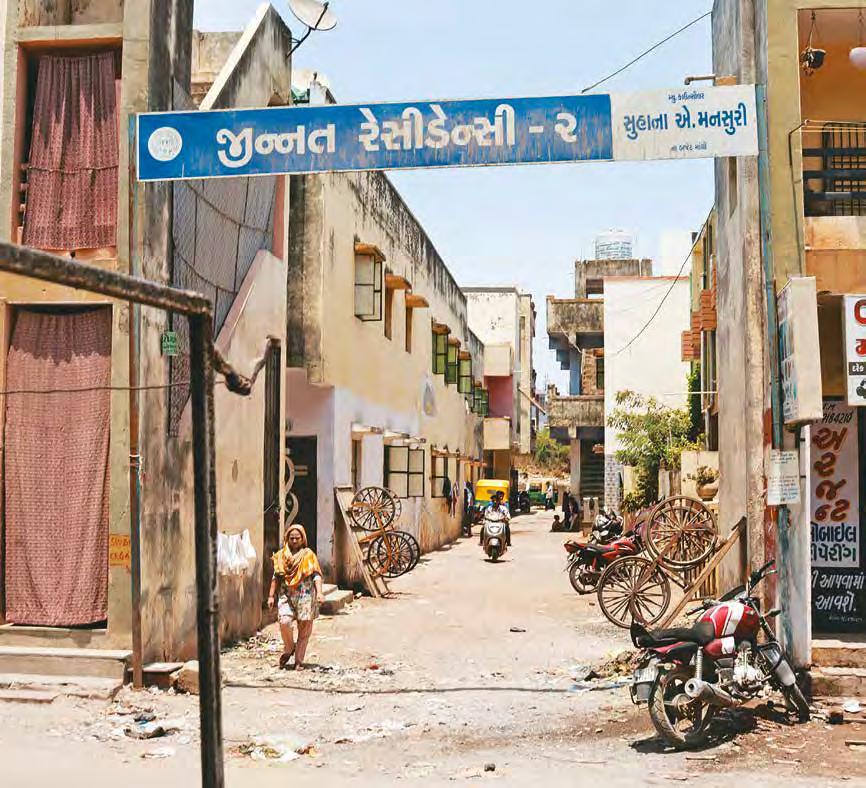Under The Model Town

THE vast stretches of the main road of Sarkhej, Ahmedabad, become narrower, the buildings smaller and more congested as you take a detour and enter into what is known as India’s largest urban Muslim ghetto. Surrounded by settlements of the riot-hit minority community, the lanes lead up to a towering brick wall with fencing on top, built with the sole purpose of separating the Muslim population from its neighbouring Hindu colony, Vejalpur. This is Juhapura, an area located just a few kilometres away from the heart of Gujarat’s largest city, Ahmedabad. While it was founded as a rehabilitation project for the flood-hit victims in 1973, the area took a whole new meaning with a series of communal tensions over the next few decades.
The contrast here is stark: tall buildings lining up the Hindu colony, and waterlogged lanes, crumbling small houses and the poor economic conditions in the Muslim settlement. The streets of Juhapura are brimming with autorickshaws and cycles, lined on either side by meat shops, barber shops, mechanics and offices of travel and estate agents. It is usually at its busiest when the sun is up and shining. The bylanes open into multi-storeyed concrete structures stacked up like Lego blocks. Inside, the rooms are small and functional, housing a family of four or more and bearing the weight of an urban life amidst neglect and decay.
Shagufta Anjum, 38, lives on one of these lanes of Juhapura area. Early in the morning, as she prepares to get ready for the day, she calls out to her brother looking up to the corridor outside a cramped nine-by-nine room, “Switch off the pump. There has been no water since yesterday.”
“Today is jumma,” she turns to us and says. “But look, we don’t even have water to bathe. See how much the government is doing for us.”
Denne historien er fra May 11, 2024-utgaven av Outlook.
Start din 7-dagers gratis prøveperiode på Magzter GOLD for å få tilgang til tusenvis av utvalgte premiumhistorier og 9500+ magasiner og aviser.
Allerede abonnent ? Logg på
Denne historien er fra May 11, 2024-utgaven av Outlook.
Start din 7-dagers gratis prøveperiode på Magzter GOLD for å få tilgang til tusenvis av utvalgte premiumhistorier og 9500+ magasiner og aviser.
Allerede abonnent? Logg på

Education for the Greater Good
UEM Jaipur in its Mission to Provide Global Exposure with Innovative Teaching Techniques

Delivering Care Everywhere
Innovative healthcare, accessible to all communities across India

First Model Hospital for Global destination with New Benchmarks
Yashoda Medicity is a holistic ecosystem, a convergence of medical brilliance, technology, education, and patient-centred values, poised to redefine healthcare delivery in India and beyond

Green Growth: A New Normal
Indian real estate embraces sustainable design, net-zero goals and eco-friendly innovation to shape resilient, future-ready urban landscapes.

Precision Meets Expertise
Pioneering ROBOTIC Knee & Hip Replacements, Dr (Prof) Anil Arora is redefining mobility with advanced technology and compassionate care

The 5 Best Monsoon Treks in Maharashtra
This curated list of the best monsoon treks in Maharashtra highlights both natural beauty and historical significance of the state while also being ideal for lovers of adventure

Batwoman
Women have gatecrashed a stag party, smashing their way through the sexist walls of bias and invisibility to live their cricket dreams, no more in the margins but in the spotlight

Elite Bench
Why diversity and inclusion in cricket remain elusive
'Write What Should Not be Forgotten'
Chilean-American author Isabel Allende’s latest book My Name is Emilia Del Valle, set during the 1891 Chilean civil war, is the story of a young woman’s search for her identity.

It is Lonely at the Top
Chief Minister Omar Abdullah faces rebellion from within the National Conference. Lieutenant Governor Manoj Sinha is breathing down his neck. His political rival, Mehbooba Mufti, is sharpening her attack
